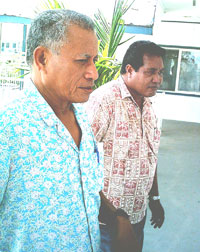By OLIVIER WORTEL
The Micronesian Alliance
 |
This interview took place on a balmy day in Yap on May 6, 2005. Standing first with Yap Governor Robert Ruecho and then sitting inside the Yap Community Action Program (YapCAP) conference room in Colonia, the new Lt. Governor of Chuuk discussed calmly and earnestly his hopes for positive change in his home state, often viewed (correctly or incorrectly) in political and social circles in Micronesia as the "black sheep" of the FSM for its well-documented infrastructure problems and political graft. Tall, well-spoken and relatively subdued, Elimo spoke honestly as to the new Administration's desires to fix the infrastructure problems in the government and business sector center of Weno, a desire to collaborate with the people to solve problems, establishing trust and the challenge of working around the more stringent U.S.- FSM Compact II rules. Shortly after concluding the interview, the new Lt. Governor was on his way to see the Chuukese people living and working in Yap for a community discussion. The Micronesian Alliance: First Lt. Governor, allow me to congratulate you on your victory. There appears to be a feeling of hope from the people, a hope for positive change with this new administration. Could you comment on this? Johnson Elimo: Thank you. It is no secret that we are dealing with some big issues as we take office. Many of the problems that we are dealing with currently revolve around the JEMCO (Joint Economic Management Committee) guidelines of the new compact and at the same time trying to deal with the real needs of our infrastructure. I know that there are a lot of challenges that we face and we have already begun to move forward in several areas. Areas that we feel are going to benefit our people. |
TMA: What are your priorities at this point?
JE: The basic infrastructures are really what we need to address now, the things that our people rely on. There is certainly money there and we need to be sure to work toward improving the basic living standards.
TMA: Is this something that you heard from your constituents?
JE: Well, yes. The practical infrastructure that includes roads, electricity, health and schools. This is the first priority. The second priority is to improve the trust with the public, which may have been damaged in the last few years. That trust must exist between the government and the people.
TMA: Could you explain what you mean by 'trust?'
JE: It's a matter of management. For example, the Department of Public Safety. There is a lack of trust in public safety specifically and in general. We need to make the necessary management changes and be more proactive in how we manage our departments, especially if they are not viewed as being effective.
TMA: The new Administration hired Bill Stinnet as Director of Public Safety (DPS) and you appear to have made some other changes at the DPS. Is this part of that management issue?
JE: Yes. We felt we had to make some serious change in that department and that is part of what we are tying to do in gaining some more credibility with the public, regaining that public trust in safety in Chuuk. It is not easy. Now people are afraid of these changes, but in the long term these will prove to be positive changes for our state.
TMA: Thank you for your time Lt. Governor. Final questions. Is there indeed hope for positive change in Chuuk?
JE: Yes, definitely. First, what is needed is good collaboration between the people and the officials so that we can make real progress on all our concerns. We really want to run on the three main principles of government: transparency, accountability and good governance. In that way the people can have no doubts as to what is going on. In my opinion this will help our hopes of positive development of infrastructure, growing the public trust in government and safety. But we need those key things: collaboration and a mutual understanding between the public and the government.
TMA: Do you have any final thoughts that you would like to share with the people?
JE: (A brief pause). Just a plea to the public. To offer their understanding and their cooperation in the concepts of the government. Without that cooperation of the public there will be so many hindrances to what we collectively want to achieve.
